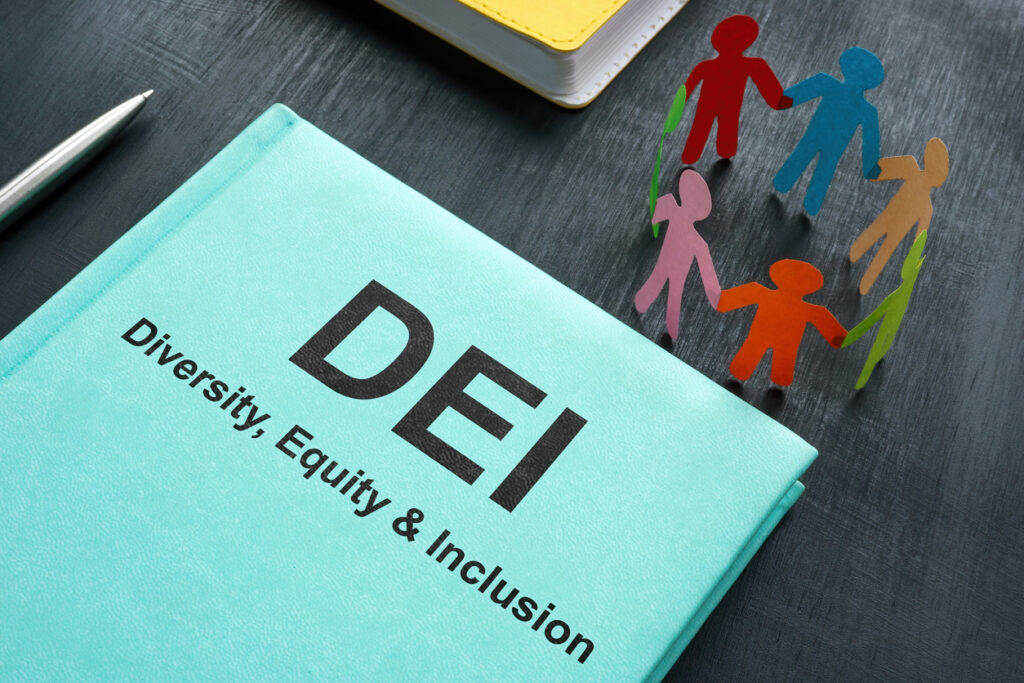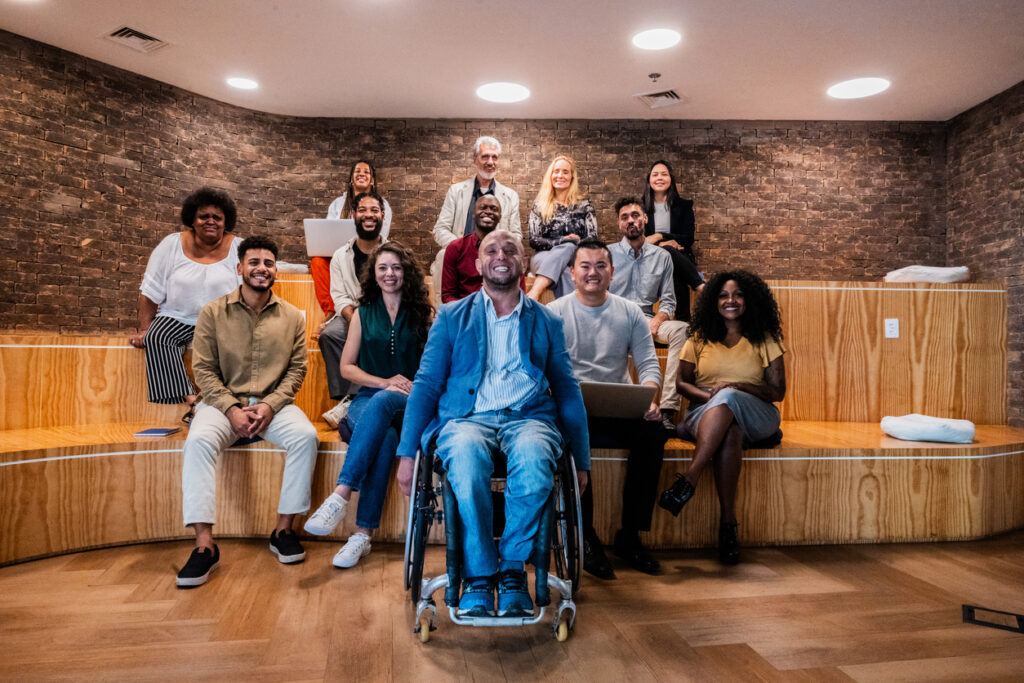
Depending on who you ask, diversity, equity, and inclusion (DEI) in the workplace is either undergoing a rebrand—or under attack. In the past, some businesses made big promises to build inclusive environments, and now, in the wake of political pressure and backlash against DEI initiatives, some companies are starting to quietly walk those commitments back.






Not everyone is retreating. In fact, a growing number of forward-thinking businesses are doubling down on DEI, even when it’s politically inconvenient. Why? Because the benefits of diversity and inclusion in the workplace are too valuable to ignore.
The intention of DEI initiatives was never about hitting quotas or meeting numerical targets. Instead, the focus was on creating environments where individuals from historically underrepresented groups feel truly welcomed, respected, and valued. It’s about opening your arms wider, inviting people to apply who wouldn’t otherwise know you are hiring. When you create a culture where everyone feels they belong, you unlock a deeper level of innovation, creativity, and performance.
Let’s take a closer look at how companies are navigating this moment and why sticking with DEI may be the smartest move businesses can make.
Think of DEI as a long-term investment. The goal isn’t just to “look diverse” — it’s to build a workplace that actually functions better because of who’s sitting at the table.
Research from McKinsey shows that companies in the top quartile for ethnic and cultural diversity on executive teams are 33% more likely to have industry-leading profitability; and a Boston Consulting Group study found that diverse management teams generate 19% more revenue. That’s not about politics, that’s about performance.
There’s also hiring and retention. According to a Glassdoor survey, 76% of job seekers and employees say a diverse workforce is important when evaluating companies and job offers. People want to work somewhere they feel like they belong. That’s not a trend — it’s a shift in workforce expectations.
In a world where your customer base is likely multicultural and multigenerational, having a team that reflects that diversity can be a major advantage. Whether it’s product development, innovation, or customer service, diverse teams can better anticipate needs and avoid missteps.

Let’s say you have a team building out a new product. If everyone in the room has the same background and similar experiences, chances are they’re going to approach the design the same way. That might feel efficient, but it’s often limiting.
Now imagine the same team includes people from different cultures, age groups, educational paths, and life experiences. They will ask questions a homogenous group wouldn’t have thought to ask. You’ll likely catch problems sooner and discover new ideas faster.
Studies show that companies with strong DEI cultures experience these advantages:
While the benefits of DEI are well-documented, it’s impossible to ignore the growing political backlash. During Trump’s presidency, federal DEI-related programs were paused or eliminated. In some states, legislation has targeted DEI training in public institutions or imposed restrictions on how companies discuss race, gender, and inclusion.
This has created a tricky environment for businesses, especially those with national footprints. Some executives worry about appearing “too political” or becoming the subject of controversy. Others are receiving direct pressure from investors, board members, or local communities to tone down their DEI messaging.
But even in this climate, many companies are quietly staying the course. In fact, some are doing more DEI work than ever but they’re just being smarter and more intentional about how they frame and implement it.

How do businesses navigate these political undercurrents without losing momentum? First, they focus on the data. It’s hard to argue with facts. By tying DEI efforts to measurable outcomes — like turnover rates, employee engagement scores, or product success — they move the conversation away from ideology and toward business logic.
Second, they invest in education. Not just for compliance, but for awareness. Ongoing training helps employees recognize their own biases, communicate more effectively, and work better across differences. This kind of skill-building makes teams more cohesive.
Third, they keep leadership accountable. When DEI is treated as a side project or PR play, it doesn’t last. The companies that see real results have leaders who show up, speak up, and put money and time into the programs they champion.
Employee Resource Groups (ERGs) have become a quiet force behind much of the DEI momentum happening inside corporate America. These are employee-led groups that support colleagues from similar backgrounds — whether that’s based on race, gender, sexual orientation, disability, parenting status, or military service.
ERGs create space for connection, mentorship, and open discussion. They also provide critical feedback to leadership about what’s working — and what’s not — on the inclusion front. Companies with active ERGs tend to have higher engagement scores and better internal communication overall.
DEI work isn’t always easy and change doesn’t happen overnight. It brings up tough conversations, asks leaders to look at gaps in their own company culture, and in today’s environment, employees may feel at risk if they are vocal about DEI topics.
Avoiding diversity doesn’t make the underlying issues go away. It just delays progress and puts companies at a disadvantage — especially when their competitors are moving forward.
One challenge businesses are currently facing is the fear of legal or political consequences. With shifting policies, some organizations are wondering whether their DEI efforts will put them at odds with regulators. That’s a valid concern, but it’s not a reason to drop DEI altogether. Programs can be shaped to meet local requirements while still supporting inclusion goals.
Another challenge is fatigue — both from leadership and employees. That’s why some companies are streamlining their initiatives, focusing on fewer but more impactful efforts. Instead of dozens of disconnected initiatives, they’re investing in manager education, inclusive hiring practices, and transparent reporting.
The DEI conversation is evolving, not ending. More companies are starting to see the benefits of diversity and inclusion in the workplace, and are embedding these principles into everyday business processes, things like hiring, performance reviews, product design, and even customer service.
Instead of labeling everything “DEI,” they’re baking inclusion into how they operate, making it a natural part of the culture rather than a standalone initiative. This isn’t a retreat; it’s a maturation.
At Next Level Strategies, we work with businesses navigating these shifts every day. The political landscape may change, but the core goals remain the same: build higher-functioning teams, support more productive work, and create environments where people can thrive. If you’re rethinking your DEI strategy or wondering how to move forward confidently, we’re here to help. Reach out to us today by filling out the form below, or call us at 415-876-NEXT, to start the conversation!
Reach out to our team of HR experts today!
Businesses are adapting by reviewing their DEI initiatives to ensure compliance with new regulations while striving to maintain inclusive practices that align with their values and corporate culture.
Diversity and inclusion initiatives lead to improved employee morale, increased innovation, better decision-making, and a stronger ability to attract and retain top talent.
Maintaining DEI efforts is crucial for fostering a positive company culture, improving employee satisfaction, and meeting the expectations of diverse consumers and a global workforce, regardless of political changes.